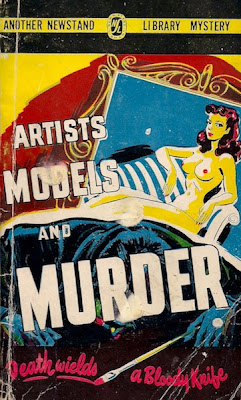Pagan
Jack Romaine [pseud. Tedd Steele]
Toronto: News Stand Library, 1949
The Pagans
Jack Benedict [pseud. Tedd Steele]
Toronto: News Stand Library, 1949
Time has come to reveal my envy of our early paperback writers. Money was good, work was easy, and as all evidence indicates, some publishers were prepared to print pretty much anything.
Consider
Pagan, which News Stand Library published twice, under two different titles and pseudonyms, in July and August of 1949. My twelfth NSL read,
Pagan/
The Pagans is by far the weakest. In a list that includes
The Penthouse Killings and
Artists, Models and Murder, it stands out as particularly inept.
That Steele was an editor at Export Publishing likely explains much about the quality of this and other books issued under the NSL imprint. How much is anyone's guess. I'm willing to bet good money that he had something to do with this highly misleading cover copy:
“They” don’t pick Carl Chantrey up in a bar, rather he’s
brought home by Marcia Havilland. A wealthy femme fatale who delights in treating
men to one night of passion – but nothing more. Such is her body or technique or
something that past paramours follow like puppies hoping for more teat or treats or something. More than a few have ended
up at Marcia’s Satyr Lake villa, where they live off largesse that comes courtesy of an inheritance left
by her mother.
Here I mention that Marcia’s father owns a struggling pharmaceutical company. And now, in homage to the novel's structure, I'll say no more about this until the end of the review.
Back to Carl. The “fledgling alcoholic” concert pianist
passes out before Marcia can have her way. She hunts him down the next day and, removing her bikini, seduces him by the "amber pool":
"Good Lord your [sic] beautiful, Marcia."
His sentence was prematurely punctuated by the pressure of her lips against his and her body against his and once more he knew nothing but a shaking urge of ecstatic excitement. She was in his arms, eager, insisting.
The little golden chipmunk looked down from his perch on the tree above and scolded vigorously.
Cover copy has it that the encounter "shook Carl to his soul", but it's Marcia who was most affected by the good vibrations. Owing to his body or technique or something – it can't be his personality – she falls in love with Carl and becomes all clingy and smoochy and stuff.
Marcia may be a babe, but she's certainly not “a breath-taking [sic] beautiful pagan queen”. And she can't be a “condoner of
all the unbridled paganism that was practiced at her villa", because there is none. Pagan has nothing to do with religion or ritual, unless one counts end of day tipple.
On his second evening at Satyr Lake, Carl sneaks away as Marcia sleeps, and dodging bullets fired by the local police, manages to hop a train. Feeling abandoned, the former femme fatale is comforted by horsewoman friend Evelyn, whose wandering hands and words follow the finest lesbian pulp tradition:
"Yes, Marcia. I love you... don't go away from me... please... you'll understand... it's not evil... men are brutes they don't know... please Marcia... honey... you'll never worry about a man again."
Not evil? Oh, c'mon, Evelyn, we know it's your breast that has "a strange and evil passion burning fiercely within", and that this is meant to be the "Shocking Climax" sold on the front cover.
But there is no climax.
Horrified and disgusted, Marcia kicks Evelyn out of her bed and Carl returns on the next train.
Remember that pharmaceutical company that belongs to Marcia's father? Seems it was about to go under, taking Marcia's investments with it. Carl wasn't running from Marcia at Satyr Lake, rather he was running to his uncle, Senator Thomas Chantrey, in Washington. After Carl explains the situation, adding that he plans to marry Marcia, Uncle Tom awards the troubled company a large government contract.
Information comes fast and furious and the pace fairly exhausts the reader. It's been just two days since Carl was picked up in that bar and even he has trouble catching his breath:
And he doesn't... at least not in the novel's three remaining sentences.
It's a shame that it all ends so soon. Who knows what Day Three would've brought. We might have learned the reason the police were shooting at Carl – or why they ignored his return. A corrupt senator's influence perhaps?
But, you see, we've reached page 160 – and as Tedd Steele could tell you, no NSL book lasts longer than 160 pages.
Object and Access: Poorly produced mass market paperbacks,
Pagan and
The Pagans achieved just one printing each. While WorldCat shows no copies of
Pagan, the University of Toronto's Thomas Fisher Rare Book Library has a lone copy of
The Pagans. That's it. The good news is that there are currently four copies of
The Pagans listed for sale online, beginning at US$7.50.























































